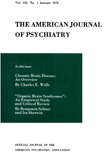DECAMETHONIUM BROMIDE (C-10) IN ELECTRIC CONVULSIVE THERAPY
Abstract
Twenty-one mental patients were given decamethonium bromide to modify electric convulsive response. A dose of 4 mg. or above was necessary to prevent aggravation of pre-existing traumatic injury. Respiratory paralysis is regularly present when doses of 4 mg. or above are given. Pentothal sodium is useful to allay fear occasioned by muscle paralysis, but in sensitive persons pentothal may produce laryngeal spasm. Training in pentothal anesthesia and oxygen administration to unconscious patients is needed by the therapist wishing to use decamethonium bromide for the more serious physical contraindications to ECT. The therapeutic effect of ECT is not interfered with by decamethonium bromide modification of the seizure. Decamethonium bromide is a powerful and potentially dangerous drug, but it is of great value when skillfully used in trained hands.
Access content
To read the fulltext, please use one of the options below to sign in or purchase access.- Personal login
- Institutional Login
- Sign in via OpenAthens
- Register for access
-
Please login/register if you wish to pair your device and check access availability.
Not a subscriber?
PsychiatryOnline subscription options offer access to the DSM-5 library, books, journals, CME, and patient resources. This all-in-one virtual library provides psychiatrists and mental health professionals with key resources for diagnosis, treatment, research, and professional development.
Need more help? PsychiatryOnline Customer Service may be reached by emailing [email protected] or by calling 800-368-5777 (in the U.S.) or 703-907-7322 (outside the U.S.).



